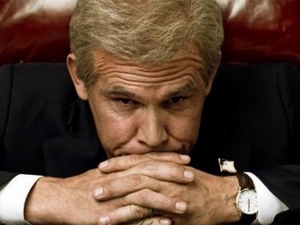[6]
Oliver Stone presents his third presidential biopic, this time putting George W. Bush under the microscope. The script by Stanley Weiser (Wall Street) is an ambitious one that sometimes struggles to find its focus, but noticeable emphasis is given to W’s estranged relationship to “Poppy” Bush (George H.W.), his struggle with alcoholism, and his born again faith. As played by Josh Brolin, W. is painted in a goofy but sympathetic light. The goofy parts are mostly on record, though Stone might have toned down the part where W. meets future wife Laura (Elizabeth Banks) while chugging beer and ripping into a mammoth hamburger. The sympathetic parts come from W.’s fears of never living up to the family name, as well as in the final moments, where he seemingly begins to doubt his presidential legacy.
The best moments in the film are Bush’s scenes with his father, played by the ever-reliable James Cromwell, and his political cabinet, where Richard Dreyfuss is superbly cast as vice-president Dick Cheney. Ellen Burstyn makes the most of her small role as Barbara Bush, and I was glad to see Scott Glenn as Donald Rumsfeld (who’s portrayed as someone who might be going just a little insane). Overall, the ensemble is solid, though I’m not sure about Thandie Newton’s off-putting impersonation of Condoleezza Rice… though the more I think about it, Rice is sort of a creepy robot person.
Stone, not a director known for his subtlety, is more restrained than usual — both narratively and stylistically — but he can’t resist opening and closing the film in an empty baseball stadium and depicting the 43rd president of the United States as someone who literally ‘misses the ball.’ Brolin’s uncouth portrayal (which I think even conservatives would have to say is pretty spot-on) and the film’s frank war room conversations will undoubtedly paint W. as liberal propaganda. (Cheney’s connection to Halliburton is never mentioned, but Dreyfuss delivers a mini-monologue that makes oil, not freedom, the ultimate reason to invade Iraq.) Still, from my liberal point of view, W. is a much kinder film than it had to be — a relatively tame depiction of the cowboy who became king.

